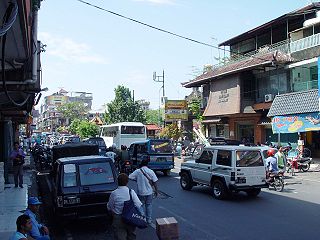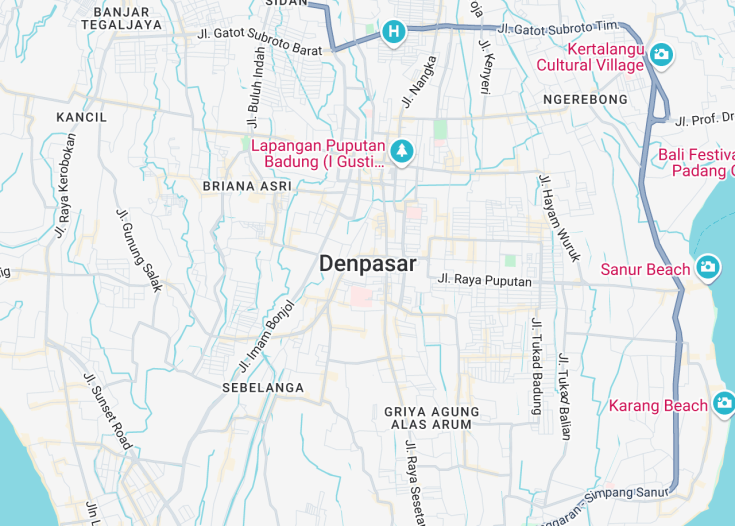Denpasar, the vibrant capital of Bali, Indonesia, offers a unique blend of traditional Balinese culture and urban modernity. As the main gateway to the island, Denpasar is brimming with historic temples, rich cultural performances, bustling markets, and museums that capture the spirit of Bali. Visitors can explore the ancient Pura Jagatnatha temple, enjoy the lively scene at Badung Market, or discover Bali’s history at the Bali Museum. This city is not just a jump-off point but a worthwhile destination rich in genuine local experiences and culinary delights.
A valuable tip for travelers to Denpasar is to partake in the local festivals and temple celebrations, which are vibrant showcases of Balinese culture and spirituality.
When planning your itinerary, consider visiting Denpasar during the cooler months from April to October, offering a more comfortable climate for exploring the city.
Top things to do & see in Denpasar
Select the following sights and activities to discover best tickets and tours available in Denpasar.
Denpasar: Gateway to Bali’s Enchanting Beauty
| Country | Indonesia |
| Time in Denpasar | GMT+8 |
| Language spoken | Indonesian |
| Population | Denpasar has a thriving urban population of approximately 897,000 (World Urbanization Prospects). |
| Currency | Indonesian Rupiah (IDR ₿) |
| Airports | Ngurah Rai International Airport (10 mi / 16 km). |
Denpasar, the bustling capital of Bali, Indonesia, is a city that effortlessly marries tradition with modernity. Nestled in the southern part of the Bali island, Denpasar is both the administrative hub and a gateway for tourists exploring Bali’s stunning landscapes and diverse culture. It is rich in history, originally a market town that served as the centre of the Badung Regency, it was rapidly transformed in the 20th century into an expression of the Balinese identity in response to the growing influence of international tourism.
Denpasar is where Bali’s past and contemporary present blend seamlessly into everyday life. Remarkable family temples dot the backstreets, their delicate incense wafting through the air, mingling with the buzz of motorbikes zipping along swiftly. Marketplaces brimming with vibrant produce and local artisans showcasing intricately handcrafted goods represent the city’s lively commerce. Not far from these bustling markets, tranquil beaches offer respite from the lively city streets, and nearby, museums and galleries narrate the island’s historical and cultural journey through carefully preserved artifacts and avant-garde artworks.
One cannot miss the annual Bali Arts Festival, a colorful, month-long celebration of Balinese culture taking place every June and July. Crowds from neighboring regions and beyond gather in Denpasar to enjoy traditional dance, music performances, and various arts and crafts that are emblematic of Bali’s cultural richness. The festival not only attracts international tourists but also engages local artists, thereby fostering a sense of community and cultural pride amongst the Balinese people.
Denpasar thus serves not only as the economic backbone of Bali but also as a cultural nucleus, constantly energized by its deep-rooted traditions and the dynamic flux of global tourism. Whether it is the serene sunrise at Sanur beach, the royal Puri Pemecutan Palace, or the spirited streets leading to the Kumbasari Traditional Market, Denpasar invites everyone to witness and partake in its unique tapestry of experiences.
Where is Denpasar?
Denpasar is located in the southern part of Bali Island, Indonesia. It is strategically positioned to access various key attractions around the island.
Distances:
| Route | Distance by car | Time by car |
|---|---|---|
| Jakarta to Denpasar | 745 miles (1,200 km) | 20-24 hours |
| Surabaya to Denpasar | 312 miles (502 km) | 10-12 hours |
| Yogyakarta to Denpasar | 361 miles (581 km) | 12-14 hours |
What is Denpasarfamous for?
Denpasar is renowned for its vibrant culture, bustling markets, and as the heart of administrative and commercial activity in Bali. It is also famous for hosting the annual Bali Arts Festival, showcasing the rich cultural heritage of the island.
History
Pre-19th Century: Early Settlements
The region now known as Denpasar has been inhabited since ancient times, initially by indigenous Balinese tribes. Archaeological findings suggest that these early communities were part of a complex society that engaged in trade and agriculture. The area was characterized by small, independent kingdoms or ‘banjars’ that were highly skilled in art, farming, and forging relationships with neighboring islands.
19th Century: Formation and Colonial Impact
In the 1800s, Denpasar began to take shape as a capital when the king of Badung established it as a center of government. The name ‘Denpasar’ roughly translates to ‘new market’ indicating its role in commerce. This period was marked by significant conflict, including harsh interactions with Dutch colonists. The most palpable event was the Puputan of 1906, where the royal family and citizens chose to fight to the death rather than surrender to Dutch forces, a grim yet pivotal moment in Denpasar’s history.
20th Century: Modernization and Growth
Post World War II, and following Indonesia’s independence, Denpasar became the administrative and cultural hub of Bali. The 20th century saw significant modernization with the development of public amenities, educational institutions, and tourism infrastructure, pivoting Denpasar to an urban hub that attracted international tourists seeking Bali’s unique culture and landscapes.
21st Century: Contemporary Developments
Today, Denpasar is dynamically blending its historical roots with modern advances. It has evolved into a metropolitan city while maintaining Balinese cultural integrity. The city has expanded its tourism sector, with a focus on sustainable and eco-friendly practices, being a role model for other cities in Indonesia and beyond.
Visit Denpasar
What to see and do in Denpasar, Indonesia
Denpasar offers a rich palette of cultural, historical, and contemporary attractions. Noteworthy sites include the Bali Museum, where visitors can delve deep into the island’s history, and the Bajra Sandhi Monument, which commemorates Balinese resistance against Dutch colonialism. For a taste of local life, one should visit the bustling Badung Market. Here’s a quick list of attractions:
- Bali Museum
- Bajra Sandhi Monument
- Badung Market
- Sidik Jari Museum
- Puputan Square
Visitors can also engage in various cultural workshops like batik painting or traditional cooking classes available throughout the city.
Recurring Events in Denpasar
Denpasar hosts several cultural events and festivals throughout the year. The Bali Arts Festival, a month-long celebration starting in June, showcases Balinese art, dance, and music, attracting both locals and tourists. Another significant event is the Sanur Village Festival, held annually in August, featuring food, music, and various water sports activities.
Best time to visit Denpasar
The best time to visit Denpasar is between April and September, during the dry season. The weather is more favorable for outdoor activities and coincides with major cultural festivals, offering visitors a deep dive into Balinese culture accompanied by pleasant, sunny days.
Is Denpasar worth visiting?
Denpasar is definitely worth visiting for those interested in experiencing a unique blend of traditional Balinese culture and modern conveniences. The city offers historical insights, vibrant markets, and local cuisine that are distinctly Balinese. However, it can be crowded and quite urban, which might not appeal to those seeking a quiet retreat. The traffic congestion is also notable. Overall, Denpasar provides a comprehensive insight into the urban and cultural life of Bali, making it a worthwhile stop in any Balinese itinerary.









